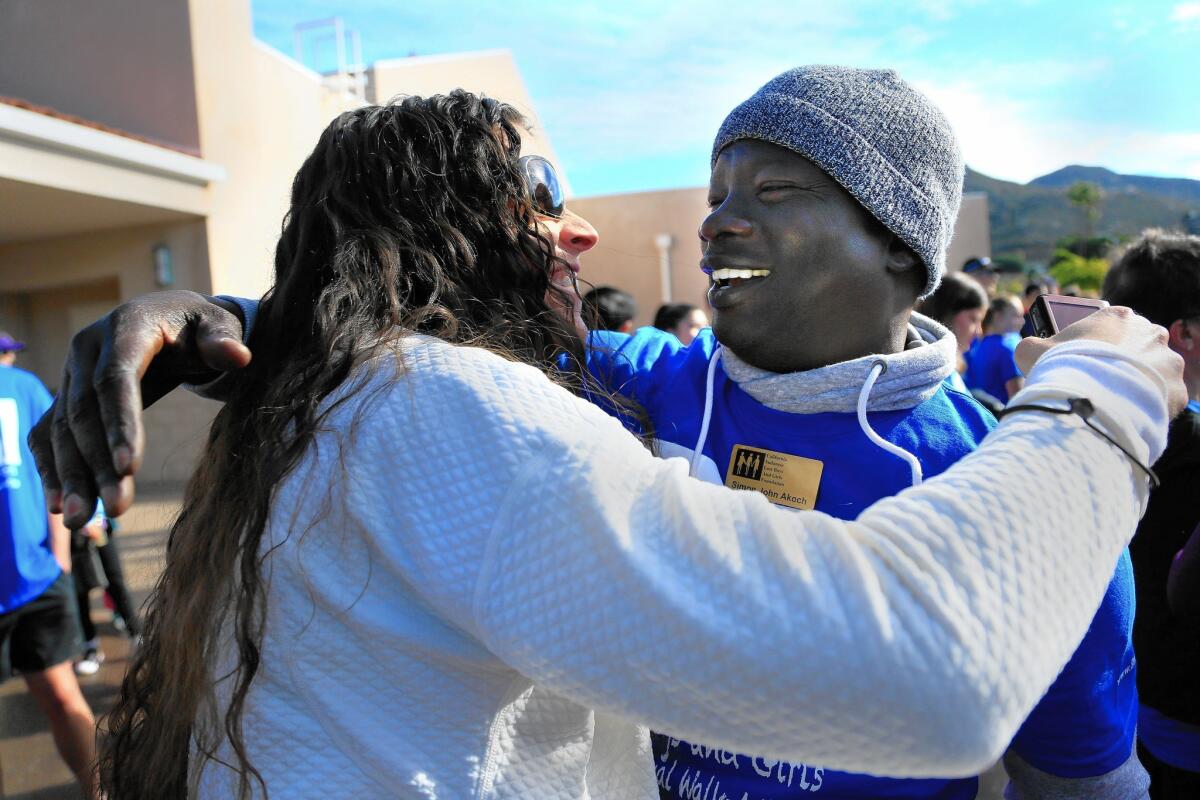As Lost Boys of Sudan reconnect in Poway, they reflect on how far theyâve come and the struggles ahead

Dr. Lisa Petronis and Simon Akoch John reconnect at the 2nd annual California Sudanese Lost Boys and Girls Foundation 5K run/walkathon Saturday.
POWAY â The Lost Boys of Sudan are men now.
A decade or so after arriving as refugees â having survived a harrowing 1,000-mile trek through war-torn Africa on foot â they have found a new life. Many have jobs, others are going to school, and some are married with children of their own.
But their journey continues.
As they gathered Saturday for the second annual California Sudanese Lost Boys and Girls Foundation 5K run/walkathon, many of the approximately 80 young men spoke of their continuing challenges.
âWith what I experienced, Iâm still in between my old life and my new life,â said Venson Deng, 36, who came to the U.S. in 2001. âIâm trying to adjust, Iâm trying to settle in ... Iâm still not there yet.â
Deng, who lives in San Diego, said the event was an opportunity to reconnect with the only people who can truly understand what heâs gone through. And to meet friends and neighbors who turned out to show their support.
âWhat makes this special is it allows us to see the goodness in humanity,â Deng said.
Walking together on the sprawling St. Michaelâs Catholic Church property were friends Val Spooner and Kathy Dunlay.
Spooner had been moved by a speech that foundation President Daniel Ukang gave to the St. Michaelâs congregation, and he decided to join the 5K. Dunlay, who has followed the story of the Lost Boys, was interested in what had become of them.
âThe books always end when they get here,â she said. âThe end.â To which Spooner added, âBut itâs not the end, is it?â
Not even close, said Lisa Petronis, a San Diego clinical psychologist who conducted a five-year study of the Lost Boys for her doctoral dissertation.
Petronis started the foundation in 2008 with Ukang, 36, and other Lost Boys. It helps pay for education, career counseling, dental care, mental health services and more.
The biggest hurdles the group faced initially, Petronis said, were learning about U.S. laws and customs, along with modern conveniences such as electricity and indoor plumbing. Today, itâs navigating life: translating education into a career, working multiple jobs, trying to build a prosperous life for their children.
Within their community, there is post-traumatic stress disorder and other mental health problems, unemployment, poverty, health issues and cultural isolation.
âThey have so far to travel to even get to the starting line, to where the rest of us started,â Petronis said.
Ukangâs wife, Mary, who met her husband when they were at the Kakuma refugee camp in Kenya, was one of the few Lost Girls to be resettled in the U.S. The couple work different shifts at the Barona Resort & Casino and trade off caring for their two boys and two girls, ages 3 to 11.
âI tell my kids, there is much opportunity in America, there is no excuse for failing,â the 33-year-old said. âI sleep three or four hours a night. Iâm so tired and I work so hard. And I love it.â
Parente writes for the San Diego Union-Tribune.
More to Read
Sign up for Essential California
The most important California stories and recommendations in your inbox every morning.
You may occasionally receive promotional content from the Los Angeles Times.










